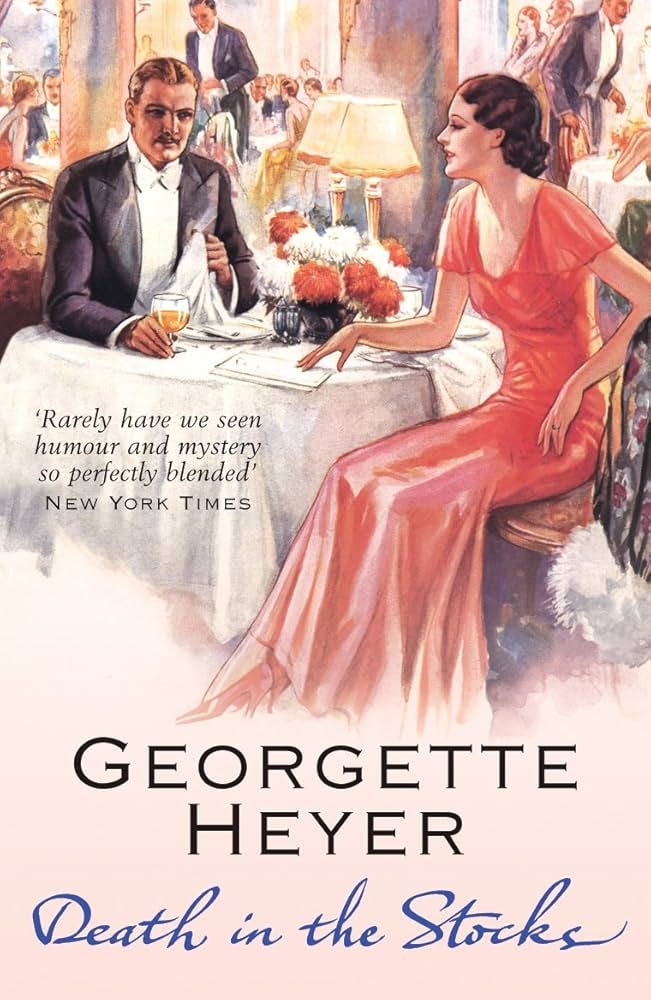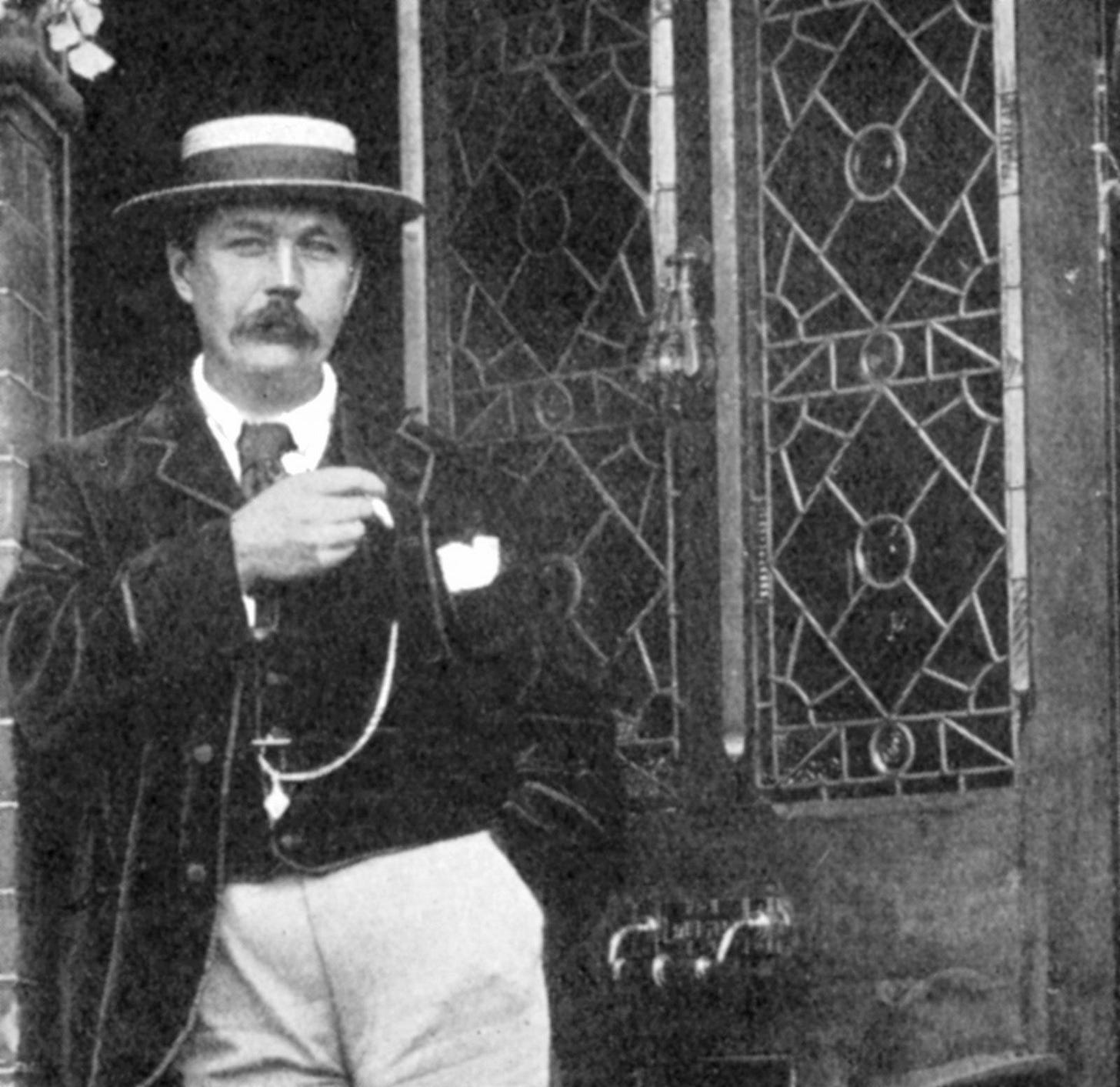S01E10: Heyer-raising crimes 🔪💔
What happens when the Queen of Romance takes a walk down mystery lane?

Dearest gentle reader,
It has been far too long since I last had the pleasure of addressing you in one of these murderous missives. I fear I can offer no excuse, save that I was severely indisposed and had to take to my couch—with a violent cold, headaches, fever, and various female complaints that I will not detail here. Each in succession, not altogether, for which I am grateful to providence.
While I am still engaged in the delicate art of soothing my nerves (a pastime that requires both patience and a great deal of tea), I have been most fortunate in the assistance of a dear friend. She has undertaken to compose this week’s principal essay, a most diverting note on the literary endeavours of Miss Georgette Heyer—known far and wide as the Queen of Regency Romance.
Though Miss Heyer is celebrated for her delightful portrayals of romance, society, and manners, it may surprise some to learn that between the years 1932 and 1953, she turned her considerable talents to the writing of detective fiction.
It is believed that Miss Heyer’s husband, George Ronald Rougier, lent his assistance to the design of some nefarious plot points; yet, when one reads the sparkling repartee, the colourful characters, and the unmistakable felicity of expression, one cannot doubt that the artistry belongs entirely to Miss Heyer herself.
With no small measure of gratitude, I now pass my pen to my dear Vasudha Gopal, your correspondent for the week.
With the highest regard and warmest sentiments, etc.

What do you get when you throw in some Bright Young Things, a country house, an attractive detective, a corpse, and the most lively banter ever to grace the pages of a crime novel? A Heyer mystery!
It was in the summer of 2018 that I read my first Georgette Heyer romance. Until then, she’d just been a name I’d known forever. Little did I know that her whip-smart, deliciously frothy novels were going to take over my Kindle and all my spare time.
One book in—The Grand Sophy–and I was hooked. Apart from the comedic master himself, Wodehouse, I haven’t read any other author who has had me in splits or left me with a goofy smile that I can’t wipe off.
After The Grand Sophy, I lapped up around 25 more delightful Heyer romances— moderation is not my middle name. Making my way steadily down the Goodreads list, I soon came face up against her detective novels: a dozen of them, most of them are murder mysteries with at least a good helping of clues.
COSY A’ LA CHRISTIE
You could say Heyer was the anti-Christie—a romance writer who occasionally dipped her toes in detective fiction, as opposed to Agatha Christie, the crime expert who branched off to write romances1 under a pseudonym.
And yet, when you read a Georgette Heyer mystery, it is impossible not to be reminded of your favourite Christies. A similar quality permeates these books—a celebration of life despite the macabre themes, astute psychological understanding, a wealth of well-sketched secondary characters—and perhaps more unpleasantly, the classist undertones.
Agatha Christie is my forever #1 author of the mystery genre. Or any genre. She might possibly be my favourite person ever2. And yet, I have to admit, I have occasionally enjoyed a Heyer mystery more, because it is a mashup of my two favourite genres: humour and crime. By the way, none of the Heyer mysteries are set in the Regency period.
WHAT TO EXPECT FROM HEYER
Heyer mysteries are classic cosy mystery fare. Well-turned plots, the usual suspects, the red herrings, the satisfying denouement—and because of Heyer’s romance moorings— always with a little love story on the side.
First and foremost, these books are such a romp. The dialogue simply dances! Heyer’s greatest strength, apart from an exquisite feel for the comic and the absurd, was possibly how well she could characterize through dialogue.
“Nothing doing. I've no doubt you think I should look noble as a sacrifice. But I've never wanted to look noble, and I won't be made to.”
Or this:
“You're more prejudiced against Paul Mansell than I've ever known you to be against anyone," said Hannasyde.
"Not prejudiced,"said the Sergeant firmly. "I never let myself get prejudiced. All I say is, that he's a nasty, slimy, double-faced tick who'd murder his own grandmother if he saw a bit of money to be got out of it.”
There’s also pithy commentary:
“Miss Allison realised with a slight sinking of the heart that she was to be made the recipient of confidences.”
“Nathaniel, regarding him with a contemptuous eye, said that a real English Christmas meant, in his experience, a series of quarrels between inimical persons bound to one another only by the accident of relationship, and thrown together by a worn-out convention which decreed that at Christmas families should forgather.”
WHAT NOT TO EXPECT
Heyer’s no novice, but don’t read her mysteries for the excellence of the plots. The actual mysteries in these books can feel pretty tame. In some of the lesser plots, for example, Footsteps in the Dark, you cotton on pretty quickly to who’s done it. And much like other Golden Age mysteries, her stories leave out most of the gory details. They feel almost wholesome, which can be a turn-off if you like your mysteries gritty and dark.
The exception to this is Penhallow, the bleakest of Heyer mysteries—more a psychological study of a toxic family system than a whodunit. Word is that Georgette Heyer wrote this book as a ‘contract-breaker’ with her publisher and didn’t care how it was received—though one biographer says, to the contrary, that Heyer was actually very proud of this book. Go figure!
HEYER PICKS FROM MY KINDLE
Georgette Heyer was a prolific writer, and in my admittedly biased opinion, every one of her books (barring a couple) is worth reading. But if I were Book Santa, here’s what I’d give away for Christmas.
The Mysteries
The Romances
Georgette Heyer pretty much invented the Regency romance subgenre that has led us, through many decades and many heavily inspired authors, to Netflix’s Bridgerton.
And yet, a Heyer romance is really more comedy of manners than anything else. There’s very little mush, no steam whatsoever, and only the briefest declarations of love (very, very unlike Bridgerton, that is to say). What you will find instead: sparkling banter between the leads, dramatic plots, hilarious and yet wholly plausible secondary characters, and detailed descriptions of Regency England (or Georgian or the earlier periods that she occasionally wrote about).
The Grand Sophy
Movie of the Week
My recommendation this week is Sookshma Darshini, a(nother) fantastic Malayalam mystery/thriller movie that is currently in theatres all over India and definitely worth a watch. It has subtitles, so not knowing Malayalam will not be a handicap.
Blurb: When a family moves into the house next door, Priya (unemployed wife and mother, actively job-hunting to put her MSc. Microbiology to use) starts noticing odd things about them. But the new neighbour is going out of his way to be friendly with everyone. Naturally, her questions are seen as nothing more than nosiness and her suspicions summarily dismissed. But Priya cannot let things rest and enters full Miss Marple mode, even roping in a couple of women friends who live nearby.
Is something sinister actually going on behind closed doors or is Priya just bored and imagining things? Let me just say—never underestimate the lengths that a bunch of inquisitive women will go, to keep their neighbourhood safe!
Rating: 🩸🩸🩸🩸🩸
Trivia of the Week
As the creator of Sherlock Holmes, Sir Arthur Conan Doyle needs no introduction. But did you know he has been involved in a real-life murder case? More importantly, his efforts were instrumental in getting justice for the accused who had been incorrectly incarcerated for nearly 20 years.
The case: In December 1908, Marion Gilchrist, a wealthy 82-year-old Scotswoman, was murdered in her Glasgow home. A gold crescent moon brooch adorned with diamonds was reported by the maid as the only missing item. The police swiftly accused Oscar Slater, a German Jewish gambler who had pawned a similar brooch. Within a week, they discovered that the brooch Slater had gambled was different. Alas, Slater’s ethnicity and lifestyle made him a convenient scapegoat. He was tried, convicted, and sentenced to death—later commuted to life imprisonment thanks to a public petition.
Slater spent years in prison before he managed to send a plea for help to Sir Arthur Conan Doyle. Interestingly, Doyle had been interested in Slater’s case as early as 1912 and had put together a letter ‘The Case of Oscar Slater’ spotting gaps in the police investigation and trying to garner additional evidence.
Around the same time that Slater wrote to him, Doyle was approached by the widow of a policeman who had kept documents revealing that the police had withheld evidence throwing suspicion on the victim’s relatives, some of whom had wealthy and influential contacts.
The work Doyle did on this case is truly Sherlockian in terms of effort and approach—and Doyle seems to have understood clearly that his brief was not to find out whodunit but to prove who definitely had not.
Eventually, after spending nearly 20 years in prison, Slater was released in 1928 after the case was re-opened. The real murderer’s identity remains unknown—although Conan Doyle is believed to have left clues in his writings.
Btw, this wasn’t the only case Conan Doyle got involved in. A few years earlier, he had been instrumental in helping George Edalji, a half-British half-Indian lawyer who had been accused of mutilating animals and sending threatening letters.
If you’re curious to know more, this article on New Republic has a lot of details.
See you next week!
Check out the last section of episode 6 of About Murder, She Wrote, to discover the “romances” that Agatha Christie wrote under a pseudonym.
Reader, you can see why Miss Gopal and I are such great friends.







I adored the bridgerton-esque writing at the beginning! Another banger edition strikes again, loved it <3 I need a couple of months to collate your recommendations and start reading, sigh.
I am a huge fan of Heyer and incidentally the first book I read was Death in the stokes. It was only later that I discovered that she wrote romance as well. There are times when I crave one of her books